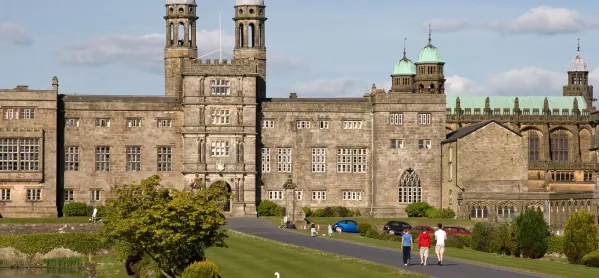‘Angry and worried’ teachers on strike over pensions

Teachers at two independent boarding schools are taking strike action today over their schools’ proposals to withdraw them from the Teachers’ Pension Scheme.
Staff at 428-year-old Stonyhurst College, in East Lancashire, (pictured), which describes itself as the “UK’s leading co-educational Catholic boarding and day school”, today begin six separate days of strike action, which the NEU teaching union says are “expected to cause significant disruption to learning and other sporting activities”.
The other school is St Christopher School, in Letchworth Garden City, Hertfordshire, where teachers are also beginning six days of action over plans that would leave them with “substantially inferior pension entitlements which will not provide them with the same benefits and securities in retirement”, according to the NASUWT teaching union.
Read: ‘Stark warning’ over the future of academy teacher pensions
News: One in 10 private schools leaves Teachers’ Pension Scheme
Revealed: Schools leaving the Teachers’ Pension Scheme
Pensions: Teachers face battle to save their pensions
NASUWT general secretary Patrick Roach said: “Our members are understandably angry and worried about these unnecessary attacks on their pension.
Teacher pensions ‘under attack’
“The school has not provided any evidence to justify this decision and has placed teachers under substantial pressure to accept an inferior pension scheme being imposed on them.
“NASUWT members are committed teachers who care about the pupils they teach. Taking strike action is a last resort, but they have been left with no choice.”
Decisions by the government to increase employers’ contributions to the TPS by 43 per cent in 2019 were described as “devastating” for independent schools, particular for smaller schools, which are being forced to meet the rise unaided from government - unlike state schools.
St Christopher School head Emma-Kate Henry said the school didn’t want to leave the TPS and recognised its “significant benefit to teaching staff” but the increase in contributions in 2019-20 alone had cost more than £221,000.
She said the school had been “working tirelessly to find a solution” and had offered staff a new pension scheme, adding: ”The industrial action has, of course, created understandable upset and anger among our pupils and their parents, so close to the resumption of full-time schooling.”
The financial pressures of Covid and Brexit are other reasons being given by independent schools for withdrawing from the scheme.
Last week the NEU annual conference heard how 147 independent schools across the country had left the TPS since 1 September last year, but that 968 still remained in the scheme and had “seen the benefits”, including in retaining the ability to attract quality staff.
The conference also heard how teachers had been balloted for industrial action in 40 independent schools and that more than 50 schools had “successfully seen off attempts to strip away their pensions”.
NEU regional secretary Peter Middleman, representing staff at Stonyhurst College, said it was “with great reluctance” that teachers were striking.
“The issue is of such magnitude for teachers’ remuneration and pension in retirement and is likely to have such a damaging effect on the continuing academic excellence to which Stonyhurst aspires that teachers feel they have no option other than to carry out such industrial action.”
John Browne, headmaster of Stonyhurst, and Ian Murphy, headmaster of Stonyhurst Saint Mary’s Hall (the college’s prep school), said the rise in employer contributions was costing an extra £320,000 per year and that this was “unsustainable” and that a “hybrid” scheme had been offered in which teachers could remain in the TPS but must make up the rise in contributions themselves, which would be covered by a pay rise.
In a statement, they said: “We are grateful to our staff who have done so much to support our pupils throughout the past challenging year and we are saddened to be in this position, despite extensive consultation efforts.”
You need a Tes subscription to read this article
Subscribe now to read this article and get other subscriber-only content:
- Unlimited access to all Tes magazine content
- Exclusive subscriber-only stories
- Award-winning email newsletters
Already a subscriber? Log in
You need a subscription to read this article
Subscribe now to read this article and get other subscriber-only content, including:
- Unlimited access to all Tes magazine content
- Exclusive subscriber-only stories
- Award-winning email newsletters
topics in this article



